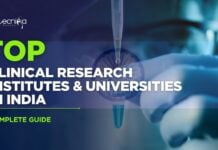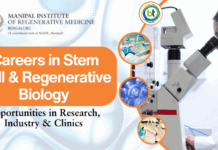How AI is Revolutionizing Biotech – What it Means for Your Career?
When the chairperson of a leading biotech company, Dr. Kiran Mazumdar-Shaw, speaks, the whole world listens. When the world was against using AI, she boldly stated, “AI and data analytics will play a key role in transforming how we approach healthcare and biotechnology. They will help us make better decisions, deliver personalized treatments, and accelerate drug development.” This statement was made during the Bangalore Tech 2024 summit.
This technological leap is not only reshaping the biotechnology industry but also creating exciting new career opportunities for professionals in the field. Let’s explore how Ai is revolutionizing biotech and what it means for career prospects in this rapidly evolving sector.
The Role of AI in Biotech
- Drug Discovery and Development – One of the most transformative uses of AI in biotech is drug discovery and development. Traditional drug development methods are very time-consuming and expensive and lead to uncertain results. AI is helping streamline the drug discovery process by using AI AI/ML algorithms to analyze enormous datasets from clinical trials, genomics, and other biological sources.
AI can predict how different molecules will interact with targets in the body, identify potential drug candidates , and even predict side effects. It can analyze large datasets to spot trends and patterns that might elude human researchers, thereby speeding up the identification of viable drug compounds. This accelerates the process of getting new treatments to market by many orders of magnitude.
AI has contributed to the discovery of drugs like DSP-1181 (OCD), INS018_055 (pulmonary fibrosis), and Halicin (antibiotic for drug-resistant bacteria).
2. Precision Medicine – The ability of AI to process and analyze large amounts of genomic, clinical, and patient data can unlock advanced precision medicine. Precision medicine is a type of treatment that aims to tailor treatments to individual patients based on their genetic makeup, lifestyle, and environment. With the help of Ai tools, potential genetic mutations or biomarkers that could predict a patient’s response to certain therapies can be identified.
By processing and analyzing patient data, Ai can assist in developing personalized treatment plans that are more effective and have fewer side effects. This shift toward more personalized healthcare is expected to make treatments more efficient and improve patient outcomes. AI tools like Genix.ai utilize genomic and EHR data for rare disease diagnostics.
3. Genomic Research – This is another booming area where Ai is making waves. The massive volume of data generated by genomic sequencing, such as that from the Human Genome Project, is difficult for humans to process without the aid of advanced computational tools. In particular, Ai algorithms are useful in analyzing this kind of data to find genetic variants, explore gene expression patterns, and predict susceptibility to diseases.
Machine learning algorithms are being used to recognize correlations between specific genes and diseases, which will help in the development of novel diagnostics and therapeutics. Ai also helps to identify the roles of various genes in complex diseases like cancer, diabetes, and neurological disorders, enabling more targeted treatments.
4. Drug Repurposing – Ai is also being used in drug repurposing, where existing drugs are tested for new therapeutic uses. Conventional drug repurposing relies on trial and error, which is a long process. AI can be applied to analyze existing drug databases and predict compounds’ success in handling various diseases by discovering patterns from chemical structures to biological data.
This process helps biotech companies identify potential treatments for conditions that might not have been noted at all. For example, researchers at Insilico Medicine used AI to identify a possible treatment for COVID-19 by repurposing existing drugs.
Online + Offline Hands-On Training Available – Starts 20th Dec 2024
5. Clinical Trials – Ai applies cutting-edge technology that improves patient cohort selection and predicts patient treatment responses. Traditionally, clinical trials have always been a lengthy and expensive process. However, Ai tools can simplify trial design, shorten recruitment time, and improve trial outcomes.
AI-powered algorithms can analyze patient data and identify individuals who are most likely to benefit from a treatment. Monitoring patient responses in real-time with the help of Ai will be possible, and adaptive trial designs can be made based on interim results. In this manner, the trial process is accelerated and harm to patients is reduced while also increasing the efficacy and safety of the drugs to be tested.
How AI is changing Career opportunities in Biotech?
The fusion of the biotech sector is creating new and diverse career paths. Demanding Ai is transforming the job market by driving innovation through biotech startups like Insilico Medicine, which use AI for drug discovery and create demand for bioinformaticians. Also, companies like DeepMind’s AlphaFold are accelerating protein structure predictions and creating demand for structural biologists.
Here are some of the key career opportunities Ai is creating in biotech.
1. AI/ML Specialist in Biotech – One of the most promising career opportunities in Ai and a machine learning specialist. These roles are responsible for developing algorithms and systems that power AI applications in biotech. Their role involves designing models and training systems and ensuring that AI tools are optimized for use in drug discovery, genomics, and other biotech applications.
AI/ML specialist needs a strong background in computer science, data science, or bioinformatics, along with a basic understanding of biological and medical fields.
2. Bioinformaticians – Bioinformaticians work with large databases using computational techniques to analyze biological data. AI plays an essential role in drug development and personalized medicine. Bioinformaticians must now be proficient in machine learning and AI technologies to analyze complex biological datasets. Bioinformaticians who have a better understanding of AI and machine learning can unlock deeper insights from genomic data, helping biotech companies discover new therapeutic targets, develop personalized treatment plans, and identify potential drug candidates more efficiently.
3. Data Scientist – This role is responsible for collecting, processing, and analyzing data to help the biotech industry. They work with massive datasets to build predictive models for drug efficacy, enabling faster and more accurate decision-making in drug development. Data scientists with a focus on biotech are in high demand as the industry continues to generate vast amounts of data. A strong understanding of AI and statistical analysis is important in this field, as data-driven insights are essential for developing innovative biotech solutions.
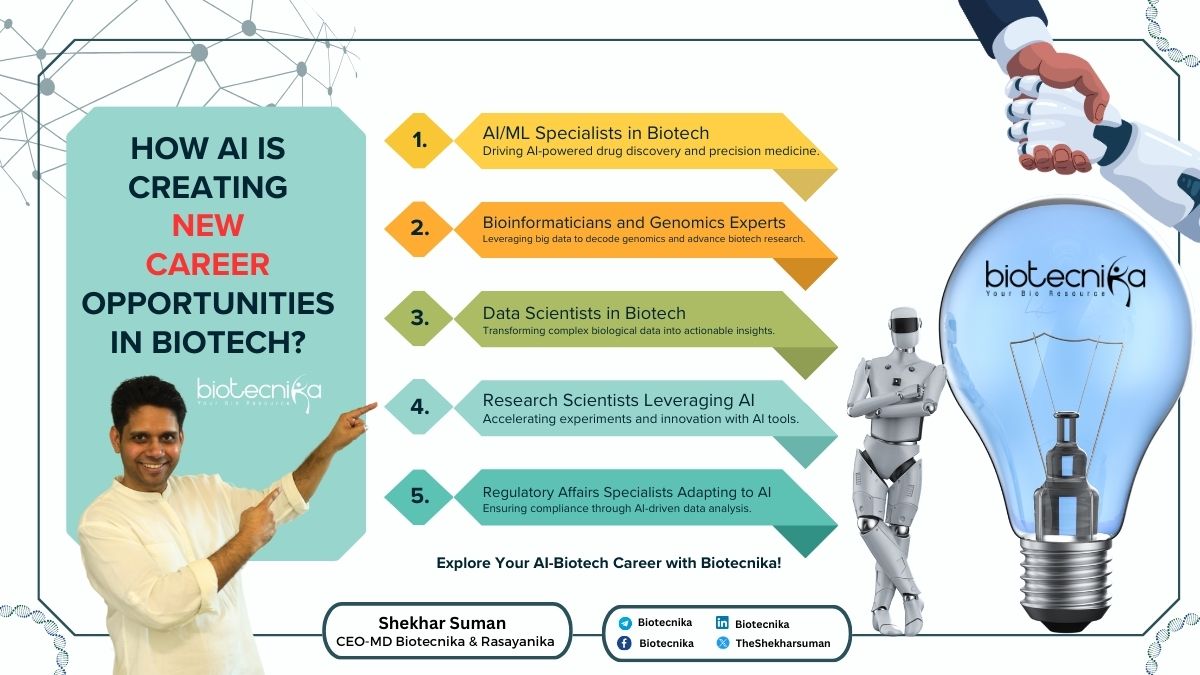
4. Biotech Research Scientist – Research scientists in biotech use AI tools in their workflow to enhance their research, such as drug discovery, genomics, and precision medicine. Research scientists must be updated on AI innovations to understand different technologies. While research scientists may not always build AI models, they must understand how AI can accelerate research and improve outcomes. This understanding enhances their ability to collaborate with AI specialists and other interdisciplinary teams within biotech companies.
5. Regulatory Affairs Specialist – As AI becomes more prevalent in the biotech industry, regulatory affairs specialists will need to make sure that AI-driven biotech solutions meet government regulations and ethical standards. They are responsible for understanding and managing the rules to ensure that AI in areas like drug development and clinical trials is safe.
These professionals need to understand how AI works and the challenges involved, such as algorithm transparency and bias in AI models that can affect biotech processes.
As Dr. Kiran Mazumdar-Shaw highlighted, AI is revolutionizing healthcare and biotechnology, driving faster drug development, precision medicine, and groundbreaking research. This transformation is creating career opportunities and bridging biology and technology.
Professionals integrating AI skills with biotech expertise will lead innovation, shaping a future of efficient, personalized, and impactful healthcare. The biotech sector is all set to reach new heights.
How AI is revolutionizing biotech? – latest article


























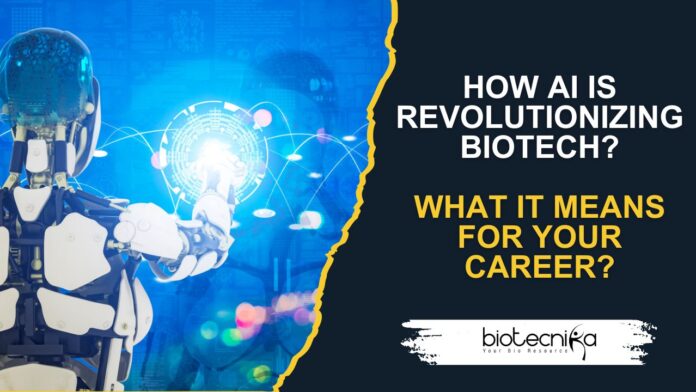

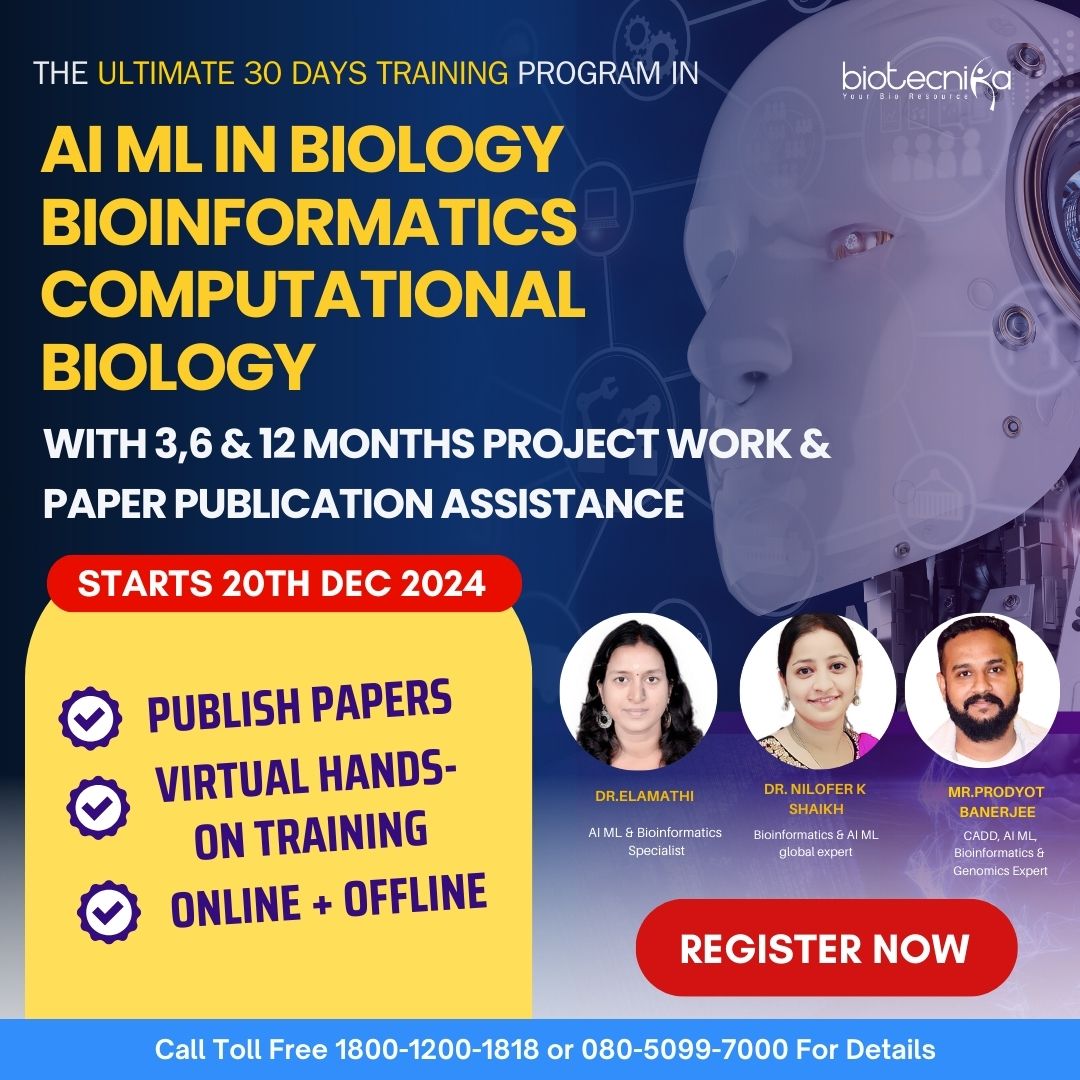 in Biology, Bioinformatics & Computational Biology With 3,6 & 12 Months Project Work
in Biology, Bioinformatics & Computational Biology With 3,6 & 12 Months Project Work 